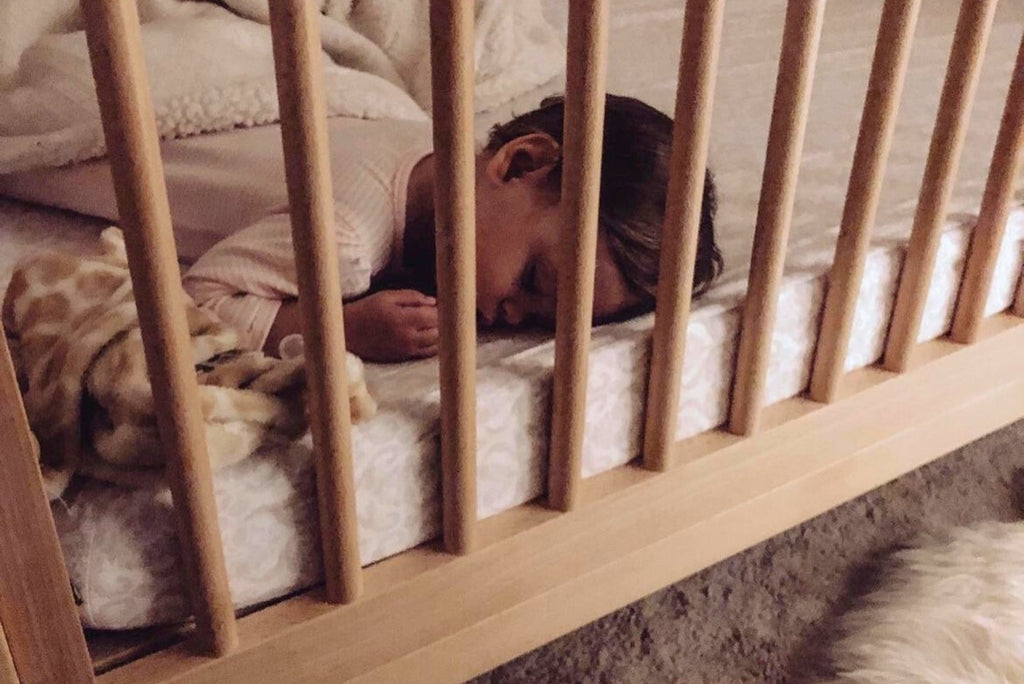How to Get Your Baby to Sleep in a Crib

How to Get Baby to Sleep in Crib
You did everything right. You spent hours researching and choosing the perfect crib, in just the right color, exactly the right style for your nursery. You ordered it with time to spare. Your sister came over to help you put it together. You got a great-fitting crib mattress and an adorable organic cotton fitted sheet set to go with it. You’ve set the scene with dimmable lights, temperature control, and a reliable baby monitor. Everything is all ready for great crib sleep.
Everything, that is, except for your baby. Your baby simply WILL NOT sleep in their crib.
We’ve been there. And the first thing you should know is every baby, and every family, is different. Sleep choices are personal, and we believe that the best choice for your baby is whichever safe, pediatrician approved method works best for your fam. There’s no one right path to great sleep. It’s a lot of stops, starts, regrouping, and trying again.
That said, if your goal is to help your baby learn to sleep, and sleep well, in your crib, we’ve collected some advice that can help! Getting your baby to sleep in a crib can be a challenge, but it is possible with a little patience and consistency. Here are a few of our favorite tips:
How to Get Baby to Sleep in Crib: Start early.
The sooner you start putting your baby to sleep in a crib, the easier it will be for them to get used to it. Most convertible cribs are certified for use with a newborn, which means you can start practicing crib sleep as soon as you bring your baby home. If overnight feels like too much at first, start with naptime, putting baby down in the crib once they’re already asleep, or right before they drift off. Starting early helps your little one feel comfortable and confident in the nursery, and teaches them from the very beginning that the crib is a great place to snooze!
Create a consistent bedtime routine.
Babies thrive on routine and consistency. By doing your best to create a predictable bedtime routine, you help your little one’s developing brain recognize a pattern and know what to expect. Make sure baby is fed, comfortable, and sleepy, then follow the same few steps every night as you prepare them for sleep.
Make sure the crib is safe.
Your crib should ALWAYS be free of any loose bedding, pillows, or toys that could pose a hazard to your baby. Crib bumpers may seem like a good idea, but they aren’t necessary and can be more of a hazard than a help. Make sure your crib is in a location with good airflow and far from anything that could fall into it, or be grabbed by a curious kiddo if your baby is already mobile.
Embrace the swaddle or sleepsack.
Many babies, especially newborns, sleep best when they feel securely swaddled. That said, remember that every baby is different. If you notice that your little one seems particularly stressed by the swaddle, or always finds a way to wiggle out their left arm, don’t be afraid to make adjustments and follow their lead. Sleep is personal, even for the smallest person.
Use a white noise machine.
Surprisingly, wombs aren’t very quiet places. Baby is used to hearing your heartbeat, voice, and the muffled sounds of the world around them while they sleep. You can recreate the muffled cacophony of being in the womb by using a sound machine. White noise, rain, ocean, and even heartbeat sounds can soothe your little one and help fall asleep faster and stay asleep better.
Put your baby down drowsy but awake.
The ability to fall asleep on their own in their crib can be helpful for your baby and for you! To help them develop this skill, try transferring them to the crib when they are almost, but not quite, asleep. They might fuss a little at first, but hopefully, they’ll soon learn to nod off quickly and easily. And remember - there are no rules, and it’s okay to trust your instincts. If the baby seems stressed and needs comfort, it’s always okay to try again tomorrow.
How to Get Baby to Sleep in Crib: Be patient.
Learning new things takes time, and your tiny baby is busy learning an entire world of new things. It may take some time for you both to get used to them sleeping in their crib. If you stay consistent, trust your gut, and do your best to make sure they have a good routine and a safe sleeping environment, sleep will sort itself out eventually!
Remember: even the best sleepers go through sleep regressions and periods of wakefulness - it’s normal, and even good, for their brain and breath development. Contrary to our “sleep like a baby” idioms, babies are rarely easy sleepers - it’s a big new world to fall asleep in. Be kind to yourself, sleep when you can, and don’t stress the setbacks - good sleep will come in time.


